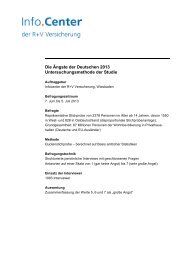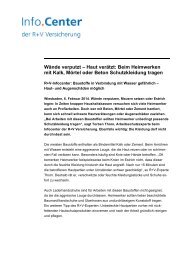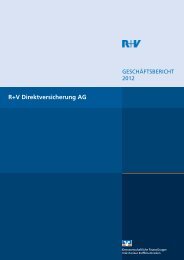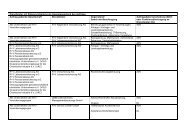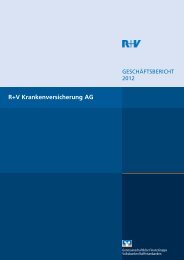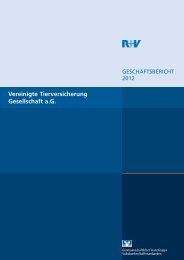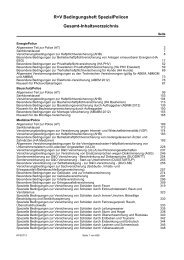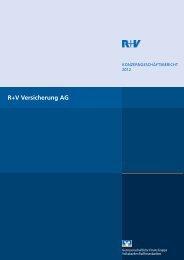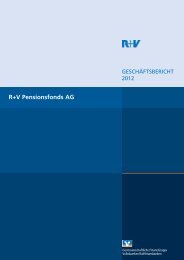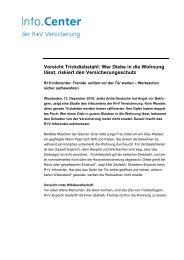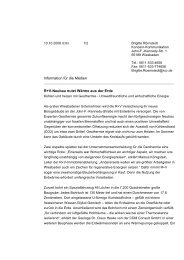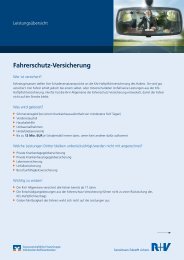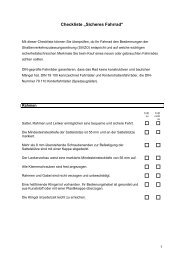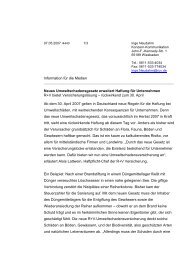R+V Versicherung AG Annual Report
R+V Versicherung AG Annual Report
R+V Versicherung AG Annual Report
Create successful ePaper yourself
Turn your PDF publications into a flip-book with our unique Google optimized e-Paper software.
Developments on the international<br />
reinsurance markets<br />
Business assumed from cedents outside<br />
the <strong>R+V</strong> Group was affected by developments<br />
on the international reinsurance markets.<br />
Because most property and casualty<br />
insurance business is deferred by one year,<br />
the following paragraphs primarily present<br />
the situation as it was in calendar year<br />
2001.<br />
Economic environment<br />
The contraction of the global economy in<br />
the middle of the year accelerated in the<br />
course of 2001, with the rate of expansion<br />
slowing substantially in almost all countries<br />
and regions. A major factor in this development<br />
was that the strong boom in the US,<br />
which had long functioned as the motor for<br />
the global economy, came to an abrupt<br />
end. The downturn quickly spread to the<br />
rest of the world via a crash in stock market<br />
prices, deterioration in sentiment among<br />
companies and finally a contraction in trading<br />
activity.<br />
This slowdown was triggered by two key<br />
factors. The preceding increase in crude oil<br />
prices curbed economies almost everywhere<br />
and fears of inflation took hold,<br />
resulting in a tightening of monetary policy<br />
in key countries. The slump was further<br />
accelerated by the downturn in the IT<br />
sector. Whereas massive investments in this<br />
area had accelerated growth in many parts<br />
of the world up to mid-2000, the slump in<br />
this sector accelerated the economy’s<br />
downturn. This extraordinary development<br />
was another reason why forecasts for<br />
numerous countries had to be revised<br />
downwards in the course of the year – even<br />
before the events of September 11.<br />
7<br />
However, in the early summer of 2001, the<br />
first indications emerged that the downturn<br />
would not continue in the same form as in<br />
the past and that a recession was therefore<br />
not in sight. The business climate brightened,<br />
both in the US and in the euro-zone,<br />
due to the improvement in underlying<br />
economic conditions and the fact that<br />
the global raw materials markets were<br />
showing signs of relaxation. At this time,<br />
the economy appeared to have bottomed<br />
out and it seemed that a recovery was on<br />
the cards for the last quarter of the year.<br />
These hopes were dashed by the events<br />
of September 11.<br />
International reinsurers had never been so<br />
affected by one single event in any previous<br />
year. The terrorist attacks in the US on<br />
September 11 resulted in the largest single<br />
insurance claim in insurance history – at<br />
least USD50 billion. The insurance claim<br />
from Hurricane Andrew, which had broken<br />
all records up to then, amounted to only<br />
half of the sum payable as a result of the<br />
terrorist attack on the World Trade Center.<br />
This puts the extent to which the insurance<br />
sector was affected in fiscal 2001 into perspective,<br />
but also highlights the enormous<br />
capacity of the direct insurance and reinsurance<br />
sector to cope with such a once-in-acentury<br />
event.<br />
This extraordinary event and the complexity<br />
of the related claims created uncertainty<br />
and led to a review of risk exposure in the<br />
entire insurance sector. The face of the<br />
insurance market changed dramatically as a<br />
result. Direct insurance policies increased<br />
almost across the board, reinsurance<br />
capacity declined and cover for terrorism<br />
risks in commercial and industrial sectors<br />
became almost impossible to come by.



